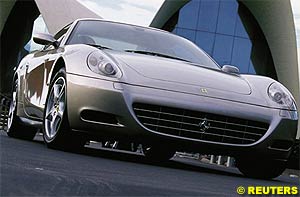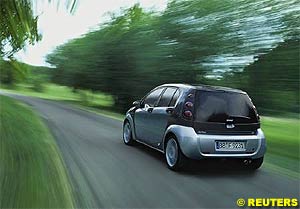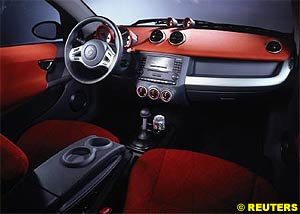

Automotive News and Reviews for the Petrolhead
Reuters Motoring Commentator
In this week's issue:
- Road Test: Four Seats and 200mph
- Road Test: Smart Enough
Welcome to the fastest four-seater in the world.
If you ever need to take four people down the autobahn at speeds in excess of 200mph, the new Ferrari 612 Scaglietti is the only car in the world that can do it.
The 612 Scaglietti - named after Sergio Scaglietti, the coachbuilder who was responsible for such legends as the Ferrari GTO - is the latest in a long line of four-seater Ferraris. It is the direct replacement for the 456M GT, one of Ferrari's best-selling cars ever, having sold 3300 examples in the last eleven years.
How Fast?
Back to that legendary speed. Ferrari has just tested the 612 Scaglietti at the famous Nardo test track in the south of Italy and achieved a remarkable 325kmh (202mph). This even surprised Ferrari's own engineers and means that the 612 comfortably ranks as the fastest four-seater in the world.
But how does it drive at speeds below 200mph? Extremely quickly is the answer. Like 90% of 612 owners, I drove the version with the F1A gearbox. There is a conventional manual gearshift on offer but the Formula 1 style paddleshift F1A transmission works so well that it really makes most sense. With the F1A, you can drive in fully automatic mode or switch to the steering column paddles - right for up, left for down. The changes are lightning fast - down to 0.2 seconds, which Ferrari says is quicker than anyone can change gear manually. To be this fast, you have to switch the cars into Sports mode, which sharpens up the steering as well as the speed of gearchanges. Perhaps the only criticism here is the sheer violence of the upchanges in Sports mode; downchanges however are beautifully smooth, with automated blips of the throttle as it moves through the gears. Also, take it out of Sports mode and it becomes a more civilised cruiser.
Lightning Fast
Acceleration is absolutely phenomenal. With the F1A gearbox, the academic 0-62mph sprint comes up in 4.2 seconds. In real world situations, overtaking is lightning fast. Thank the 5.7-litre V12 engine for that - it's almost 100bhp more powerful than the old 456's V12. That means it boasts an extraordinary 540bhp on tap, with of course no turbocharger in sight.
And yet despite this power and performance, the 612 is so refined. Yes, the V12 engine does sound like a caged animal being released on full throttle but it has a softer, more muted quality than Ferrari's V8s.
This is the first big Ferrari to be made almost entirely from lightweight aluminium but it still weighs in at a hefty 1840kg. The body is 54% more rigid than the 456, while the weight distribution is a near-perfect 54% front/46% rear, all of which has immediate benefits for handling. In fact, it feels as lithe as a two-seater. It takes some time to get used to the steering, which is fast-geared and electronically activated - and initially feels a little odd. But hit your first corner and its directness and speed-sensitive assistance blend with the delicacy of the chassis to give you unerring confidence. Its abilities are just jaw-dropping. I had the 612 sprinting between hairpin bends and just demolishing them like a lightweight sports car. Huge grip, leech-like body control and sharp, connected responses to every input. Sometimes you have to pinch yourself to remember you're actually in a very big car.
Stop, I Don't Want to Get Off
Impressive CST electronic traction control - fitted for the first time in a Ferrari - keeps things very safe and even lets you do a little manual adjustment before it kicks in - letting you feel you're part of the action. I still can't believe how good the brakes are: considering the 612 weighs almost two tons, hoofing the slow pedal seems to pull it up in an impossibly short time.
On how the 612 Scaglietti looks, opinions are divided. Of course, styling is a personal matter but Pininfarina's tasteful penwork has been generally well received. This is an imposing car on a grand scale, which is always difficult to execute. Not every element is perfectly integrated in my view - I reckon there is some slabbiness around the front end - but it is recognisably a Ferrari. Its scallops were inspired by a one-off 1954 Ferrari built for Ingrid Bergmann.
Inside, the 612 is a picture of good taste, sports detailing and ergonomic quality. In an impeccably manicured cabin, the only fault I could find was some visible glue under the triple minor gauge binnacles. 95% of customers will take advantage of Ferrari's personalisation programme to specify their own particular choice of exterior colour, interior and equipment. For instance, you can order a different colour aluminium trim inside, or even opt for a bright yellow rev counter.
Sold Out
Around 550 cars per year are expected to emerge from the Modena factory each year, of which 60 are set to arrive in the UK this year. But if you want one, be prepared to wait: the allocation has been sold out for fully 18 months.
Did I like the Ferrari 612 Scaglietti? I was intoxicated. This is close to the perfect car: capable of exceeding 200mph, transporting four adults and their luggage and yet cornering like an agile small sports car. Close to perfect? Yes, there is one small problem: the minor matter of the £170,000 price tag and that year-and-a-half wait.
Written by Chris Rees
Life is all about brands these days.
That's why we no longer simply buy cars, music and holidays. We now buy lifestyle statements. What we drive, what we listen to and even where we go for two weeks in the summer or late spring - if you're really cool - are all carefully considered expressions of ourselves and the pressure not to get it wrong can be exhausting. Getting it right is twice as difficult. So what if I want to chicken-nod to REO Speedwagon on my way to Rhyl this year? In my Austin Allegro, alone.
The problem with all of this is that being too closely identified with any particular brand can seem a little low rent, as if one is trying just too hard. Even anti-establishment figures who choose to resist modern market forces are making a statement, every bit as much as someone who, let's say, drives a new MINI. Here is a contemporary update of a classic original that is so good, so chic and so successful, it is also dangerously close to being, well? just too much. If you're thinking of getting one, whatever you do, resist the temptation to fetter the blessed thing with national flags or stripes or chequered patterns. The car makes such a statement anyway, adorning it further is simply vulgar. Apologies to everyone with a Union Jack roof, but I bet you regret it.
But who drives a smart? It's not easy to say. Unlike the current MINI, but just like the original version, a smart is as classless a car as you will find on the road today, as likely to be driven by a recently-passed learner as a city boy with a conscience - possibly an oxymoron?. It certainly gives little away in terms of the driver's income. According to Daimler-Chrysler, the makers of smart, the typical customer is as likely to be a man as a woman, so there's no real clue there. And while just over half of all smart owners are reportedly aged 45 or under, that still leaves just under half who aren't. In fact, the only thing we do know about the ?average' smart driver with any certainty is that he or she never goes anywhere with more than one passenger, given that all models are two-seaters.
Bring the Kids
Or rather, they were. The smart name is about to become familiar to a whole new audience when its new Forfour model goes on sale in September. This is a smart for people with children or more than one friend because it has five doors and a rear seat, making it a much more mainstream proposition. It is an interesting newcomer in this most competitive of sectors. There are five engine choices (three cylinder 1.1; four cylinder 1.3; and four cylinder 1.5 petrol; plus two versions of an all-new Mercedes-Benz 1.5 three cylinder diesel) and, as you might expect, all meet the latest Euro IV emissions regulations. Each comes with a five-speed manual gearbox as standard, and smart's clutch-less softouch system as an option. This latest version of the semi-automatic gearbox offers a fully auto or sequential manual setting, with the added benefit of steering column mounted paddles. One day, surely, all cars will be like this. You can choose from two trim levels - the familiar Pulse or posher Passion, and no less than 30 colour combinations, all of which feature smart's signature two-tone styling of contrasting (plastic) body panels and Tridion safety cell.
On the move, the Forfour is an engaging drive, however. It performs and handles with sufficient character to remind you of its bloodline, without doing anything particularly brilliantly or remotely badly. As an all-round package, it can definitely be described as a lot of fun. The power output of each engine is more than competitive in the class (109bhp for the 1.5 litre) but the entry level 1.1 (3 cylinder) feels like the pick of the bunch. It makes the best noise and seems the most eager and, particularly with the optional softouch gearbox, provides an entertaining means of cutting through rush-hour traffic.
Premium Pricing
You will read reports about the Forfour being expensive, and pricing is still to be confirmed, but expect to pay a little under £9,000 for the 1.1 Pulse with a range-topping 1.5 Passion costing in the region of £12,500. It is certainly premium priced but then it's going to be, because people are willing to pay it. We're back to the issue of brand statements and style. Smart considers the MINI (in terms of style), Peugeot's 206 (for practicality) and the Volkswagen Polo (levels of quality) to be the critical competition. Well the Forfour certainly feels well made. It offers flexible accommodation, class-leading economy and the lowest emission levels in the sector. Inside and out, safety is a priority and all models come with four passenger airbags and stability control/anti-lock brakes. But what about the all-important issue of style?
The Forfour does not come close to the MINI as a physical statement, but there's more to this question of style than simple aesthetics. It's what the smart doesn't say that is more significant. Choose the new Forfour, and not only are you guaranteed not to get it wrong, you'll actively be getting it right. Dynamically and practically this car is more than competitive in its sector. More importantly, as a lifestyle statement it can't be beaten. In the brand conscious times in which we live, that's the smartest part of all?
![]() Road Test: Four Seats and 200mph
Road Test: Four Seats and 200mph
 The 612 is an atypical car for Ferrari: most of the Italian manufacturer's high-performance models are simply not driven on a regular basis. But owners of the 612 are expected to drive 7500 miles a year - far more than any other Ferrari model - so they are looking for practicality as well as performance. They get it. Compared to the outgoing 456, the Scaglietti is 14cm longer. Inside it is bigger - indeed the two rear seats are positively palatial. There is plenty of rear headroom even for six-footers, while legroom is acceptable for most passengers, even on long journeys. The boot at 240 litres is bigger than many hatchbacks and can fit two sets of golf clubs, a sad but essential requirement for a car like this.
The 612 is an atypical car for Ferrari: most of the Italian manufacturer's high-performance models are simply not driven on a regular basis. But owners of the 612 are expected to drive 7500 miles a year - far more than any other Ferrari model - so they are looking for practicality as well as performance. They get it. Compared to the outgoing 456, the Scaglietti is 14cm longer. Inside it is bigger - indeed the two rear seats are positively palatial. There is plenty of rear headroom even for six-footers, while legroom is acceptable for most passengers, even on long journeys. The boot at 240 litres is bigger than many hatchbacks and can fit two sets of golf clubs, a sad but essential requirement for a car like this.
![]() Road Test: Smart Enough
Road Test: Smart Enough
 And then there is the handful of brands and products that simply don't conform to these rules. Smart is a good example. When smart revealed the original Fortwo (formerly known as the City Car), almost six years ago now, the world was flabbergasted at how clever it all was: interchangeable plastic body panels; low emissions economy; a spacious, funky cabin for two; a modish sequential gearbox. It was unique enough to become an instant icon.
And then there is the handful of brands and products that simply don't conform to these rules. Smart is a good example. When smart revealed the original Fortwo (formerly known as the City Car), almost six years ago now, the world was flabbergasted at how clever it all was: interchangeable plastic body panels; low emissions economy; a spacious, funky cabin for two; a modish sequential gearbox. It was unique enough to become an instant icon.
 Inside, the same funky approach has been adopted that made the Fortwo, and the more recently launched Roadster and Coupe, so individual and, in the most part, it is equally successful. Up front, there is a general feeling of space and the instruments and controls are conveniently located, with a number of innovative features for this sector - Bluetooth connectivity and iPod compatibility, for example, all so in-keeping with the smart image. Which is more than can be said for the standard-fit audio system. It works and sounds OK (minor points) but looks ridiculous (rather more important), a bit like a Binatone clock radio, circa 1989. And while the knives are out, it's also worth mentioning the functionally cool centre armrest in Passion models that swings forward from the rear - it's great as an armrest or cup holder but even better as a barrier to the electric window switches, which are mounted centrally, on the floor. It renders them very awkward to reach for front seat passengers but, worse still, impossible to reach for rear seat passengers. It is a remarkable oversight by those usually incomparable ergonomic experts from Germany.
Inside, the same funky approach has been adopted that made the Fortwo, and the more recently launched Roadster and Coupe, so individual and, in the most part, it is equally successful. Up front, there is a general feeling of space and the instruments and controls are conveniently located, with a number of innovative features for this sector - Bluetooth connectivity and iPod compatibility, for example, all so in-keeping with the smart image. Which is more than can be said for the standard-fit audio system. It works and sounds OK (minor points) but looks ridiculous (rather more important), a bit like a Binatone clock radio, circa 1989. And while the knives are out, it's also worth mentioning the functionally cool centre armrest in Passion models that swings forward from the rear - it's great as an armrest or cup holder but even better as a barrier to the electric window switches, which are mounted centrally, on the floor. It renders them very awkward to reach for front seat passengers but, worse still, impossible to reach for rear seat passengers. It is a remarkable oversight by those usually incomparable ergonomic experts from Germany.
| Contact the Editor |
© 2007 autosport.com . This service is provided under the Atlas F1 terms and conditions.
|
Volume 10, Issue 13
Atlas F1 Exclusive
Interview with David Richards
Interview with Geoff Willis
Interview with Jenson Button
Interview with Takuma Sato
Articles
Every Other Sunday
The Paint Job: Part IV
Telling Teammates Apart
2004 Bahrain GP Preview
2004 Bahrain GP Preview
Bahrain GP Facts & Stats
Columns
The F1 Trivia Quiz
Bookworm Critique
On the Road
Elsewhere in Racing
The Weekly Grapevine
> Homepage |